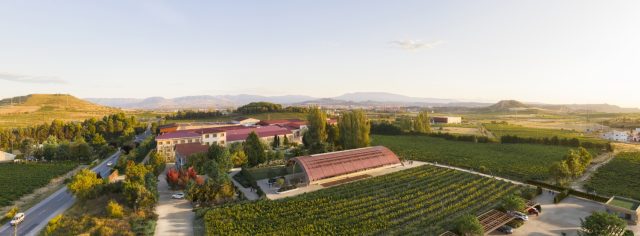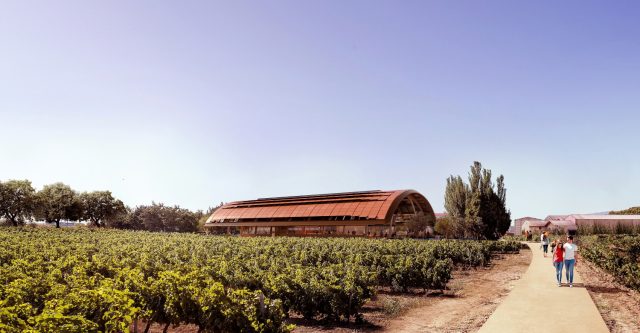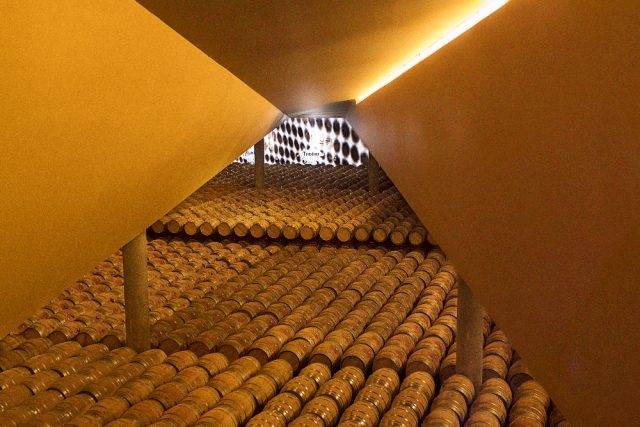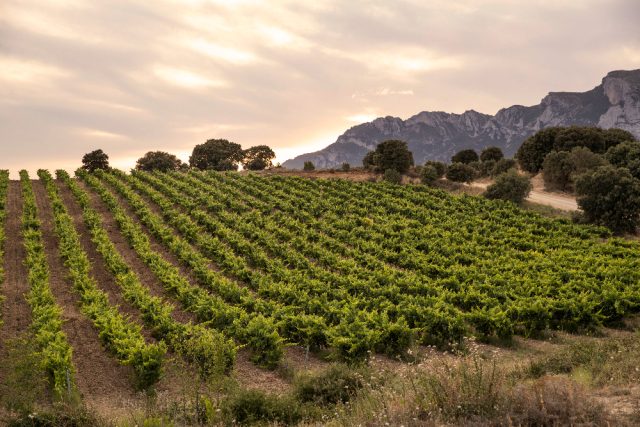This website uses cookies so that we can provide you with the best user experience possible. Cookie information is stored in your browser and performs functions such as recognising you when you return to our website and helping our team to understand which sections of the website you find most interesting and useful.
Bodegas Faustino provides a lesson in sustainable winemaking
Bodegas Faustino has presented a vision for the future of winemaking with its overall commitment to sustainability, and showcasing innovation at the winery and new visitor centre.

The company has won both fresh sustainability accreditation and also worked with Foster+Partners to reveal the design of its buildings, dubbed the ‘Legado Bodegas Faustino’ or ‘The Bodegas Faustino Legacy’, in a move that it describes as “a paradigm for how future wineries will be”.
The complete design of Bodegas Faustino and Foster+Partners, presented by Lord Norman Foster and wine-growing company Familia Martínez Zabala, includes the remodelling of existing facilities as well as new areas for visitors, the main focus being a new building.
Aiming to be a benchmark of such a design for the industry, the project will be one of the most innovative and sustainable architectural complexes in the wine world.
Through building the centre, Bodegas Faustino is committed to immerse visitors in the world of wine, a unique connection between wine and people that will highlight the importance of the land and the winery. The new main entrance will be covered in vegetation, allowing for visitors to journey through onto a gentle walk through the spectacular vineyards, leading to the new visitor centre that echoes the surrounding buildings.
Lourdes Martínez Zabala, CEO of Familia Martínez Zabala, said of the plans that the fourth generation of the family wants to leave “a legacy” at Bodegas Faustino, “where our roots are, always looking to the future.”
Lord Norman Foster, Foster+Partners explained the details behind the project, which is dubbed ‘Energía Plus.
He said: “This project is all about the visitor experience and not just the construction of a new building that allows visitors to be immersed in the vineyards of Bodegas Faustino. A project that we call ‘Energía Plus’, since the central building only consumes 20% of the energy it generates and the rest fuels the other facilities in Bodegas Faustino. All this through the introduction of innovative technologies in every building, managing to make Bodegas Faustino 100% self-sustainable in terms of energy.”
A new building for visitors, a benchmark in the sector

The new visitor building is inspired by the original heritage of the winery and will consist of a light structure made of wood from local forests. A wooden anti-funicular arch will maximise the building’s structural performance and minimise material use, while an earthy colour palette will allow the structure to blend seamlessly with the earth and red autumn vines.
As with the entire project, innovation and sustainability are a core part. A large glass roof will incorporate photovoltaic technologies that will produce almost six times the energy consumed by the building, which in turn will be used by the rest of the buildings in the winery complex.
A central skylight and carefully integrated glass façades will bring natural light into the indoor spaces, reducing the need for artificial lighting. Natural building materials will contribute to a biophilic environment and improve the well-being of visitors and employees.
The indoor space of the central building will be vaulted and without columns, creating an extremely spacious and flexible room, integrated into the beautiful landscape of vineyards.
According to Foster+Parners, it is nature and respect for the planet that drive the project in all design decisions for ‘The Bodegas Faustino Legacy’, in order to achieve what they define as “one planet projects”: those with an ecological footprint that can be absorbed naturally by the ecosystem of the planet.
The result of ‘The Bodegas Faustino Legacy’ is a solution of maximum efficiency, which will allow the winery to offer the best wine tourism experience, making room for activities aimed at hosting the most complete and exclusive set of experiences around wine, vineyards, nature, architecture, culture and innovation and sustainability.
Climate protection

The news comes as Bodegas Faustino and Bodegas Marqués de Vitoria are the first wineries in Rioja to be awarded the new Sustainable Wineries for Climate Protection (SWfCP) certification, which details the criteria that wineries of the present and the future must meet in terms of sustainability.
SWfCP is the world’s first and only environmental sustainability certificate specifically for wineries and it was created by the Spanish Wine Federation (Federación Española del Vino – FEV), focusing on four main aspects – environmental, social, economic and governance – as an international benchmark across the wine world.
These criteria centre around four elements that are of utmost importance and are supported by the United Nation’s Sustainable Development Goals, which provide companies and people with a road map for creating a more sustainable world.
These four criteria are:
- Environment (water and waste management, energy efficiency, GHG emissions, soil and biodiversity);
- society (health and safety of consumers, works and providers and of the local territory and culture);
- economy (efficiency and resilience) and;
- governance (sustainability management, ethical behaviour and stakeholder relations).
Achieving the certification, which is recognised throughout the Spanish and international distribution sector, helps the wine-growing company Familia Martínez Zabala lead its wineries towards attaining optimal quality, using continuous improvement to improve the efficiency of all their processes in both the medium and long term.
Committed to the environment and socio-economic surroundings

Sustainability is one of the Familia Martínez Zabala’s top priorities, forming a fundamental part of its wineries and vineyards since the very beginning and playing an essential role in its management model.
Throughout its history, the company has been involved in countless innovative initiatives with which it adapts to climate change, all while protecting and respecting biodiversity, by developing new processes that boast a reduced carbon footprint and thus constantly enhancing the high quality of its top-of-the-range wines, ensuring that it leaves only a positive impact on its natural and socio-economic surroundings.
The wine-producing company continues to develop innovations and implement control systems that help allay the consequences of climate change on its wines and vineyards, rolling out new tools that improve the standard of its products and keep the effects of global warming at bay, always keeping one eye on the future.
Bioprotection

As part of its efforts to protect and conserve its natural surroundings, and the biodiversity it is home to, the Familia Martínez Zabala has opted for organic pesticides over chemical ones to treat illnesses in its vineyards, thus doing away with the negative influence that the latter have on human, animal and plant life.
The Familia Martínez Zabala is also acutely aware of the influence that nature has on its vineyards, and as such it has implemented efficient measures, such as respecting its plots’ natural boundaries, installing nest boxes for birds and bats, building “insect hotels” and installing green roofs to prevent soil erosion and water loss, among many others.
All of these initiatives have been key to Bodegas Faustino and Bodegas Marqués de Vitoria obtaining the new SWfCP certification, proof of its commitment to the environment, and an internationally recognised seal of approval for two pioneering wineries that have their gazes firmly set on the future.

